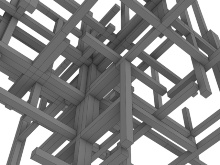Associative and Algorithmic Design
First Meeting: 19.10.2021, 9:45
Computation profoundly impacts contemporary understandings of architectural form, space, and structure. It shifts the way one perceives form, the way in which form is used, and the way in which form is produced. Some of the broadly used terminologies related to how a design model is constructed are associative and algorithmic design. In the computational design discourse, associative design technique is a methodology that is based not on fixed metric quantities such as traditional design but instead, based on a consistent network of relationships between objects or geometry primitives: the assemblage of objects. In a similar way to that of associative design, developments in scripting have allowed for algorithmic design processes to advance. Algorithmic design is a system that uses sets of instructions to perform certain tasks, for example, to generate a digital model of a structure.
This seminar provides a basic introduction of associative and algorithmic design for architectural design modeling in a 3D modeling environment (Rhino) with both visual programming (Grasshopper) and scripting (IronPython). Students have the opportunity to enhance their knowledge about modeling and algorithms both in regards to practically gaining the related scripting skills and theoretically understanding relevant aspects of form generation and related mathematical and computer science principles. Based on the investigation of the related mathematics and programming paradigm, relatively simple algorithms will be developed to produce complex systems within an architectural context.
The seminar is conducted in English. Familiarity with 3D modeling in Rhino is preferred. Previous experience with programming and scripting is a plus but not mandatory.
The course will be taught with prerecorded video lectures and in person, discussion, and hands-on sessions.
Interested students should apply with a portfolio of their digitally modeled projects from any previous courses.
The portfolios should be sent to thomas.wortmann@icd.uni-stuttgart.de.


